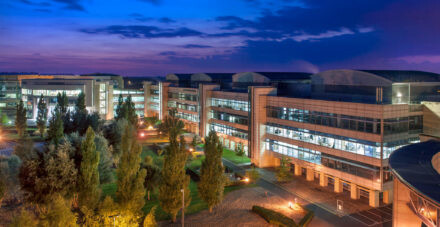
October 21, 2016
It’s a challenging time for UK plc as the country sets sail for a post-Brexit world but the South-East’s leading science and technology focused campus, Discovery Park is confident of a globally successful future.
Located in Sandwich and part of Dover district, this formerly Pfizer owned R&D hub has long seen itself as being inextricably linked to Europe, with France just a short hop across the English Channel.
But initial uncertainty following the 23 June ballot over what this would mean for research funding and collaboration between the continent’s finest scientific minds has been replaced – for now at least – by a determination to seek out new opportunities, and to be ready for what comes next.
Paul Barber, Managing Director, Discovery Park, said: “For businesses to thrive as we head for the EU exit, they need to be positive about the future and think global.
“Since taking ownership of the site in July 2012 Discovery Park’s mission has been to increase the site’s outward focus, attracting science companies from around the globe; creating a new diverse and supportive community, built on partnership and collaboration.
“From the outset this multi-business approach has been key, primarily to ensure the site is no longer reliant on a single company. With an eye already focused overseas, it will also help to ensure the site has the resilience to thrive in a post-Brexit world.”
In just four years Discovery Park has grown from five companies employing around 800 people between them to more than 150 businesses, and over 2,500 jobs. With 70,000 sq ft of new manufacturing space coming on stream in the first quarter of 2017 – the number of people working on site looks set to pass the 3,000 milestone next year.
A lot has been achieved in a short time with more jobs, more investment and more opportunities for East Kent on the way. There is no sign of that abating. The best,” Paul Barber adds, “is yet to come.”
Part of the Discovery Park’s global appeal is its reputation as a centre for scientific excellence, including the exciting area of immunotherapy, with India-based Curadev, the latest to join a cluster of businesses exploring new treatments for cancer and disease.
Centauri Therapeutics, for example, has established a core R&D facility at Discovery Park with an experienced team of industry scientists focused on discovery, optimisation and development of novel ‘Alphamer’ molecules targeting acute hospital acquired infections.
In March 2016 the company announced a Joint Venture (JV) agreement with Cambridge-based Horizon Discovery Plc to exploit its technology within the rapidly growing immune-oncology market, currently valued at £25bn.
Mike Westby, Chief Executive, Centauri Therapeutics, said: “Science has always been about collaboration across borders – Brexit doesn’t change that.
“Our program and our value proposition are as strong as ever. We definitely experienced a dip in investor interest immediately following the Brexit vote, but this is now starting to pick up again. Our sense is that people will still want to invest in the UK.”
Centauri Therapeutics are one of a number of companies with international connections including sister R&D firm Agalimmune; Sydney based fertility technologies business, Genea Biomedx; global generics experts, Mylan and, of course, Pfizer, which retains a significant presence on site.
Discovery Park’s status as a flagship Enterprise Zone, has played its part in attracting new companies to site, with a range of flexible options available to suit their current and future needs – from desks in the start-up zone to larger sized units.
Space is also reserved for sectors that R&D companies can turn to along the corridor – from recruiters and accountants to marketing experts and web designers. Education providers, including East Kent College and Canterbury Christ Church University (CCCU), have also been a key target – as part of a strategy aimed at encouraging more of the area’s young people to take up careers in science.
CCCU moved into Building 500 earlier this year – an iconic, world class science facility offering 250,000 sq ft of refurbished lab and office space; sustainably powered from Summer 2018 – along with the rest of the site – by a new £160m bio-mass plant.
Their industry liaison laboratory involves PhD students working alongside R&D companies on site to tackle specific areas of research, including an ongoing project with site tenant Venomtech Ltd, to discover how products developed from venom could aid the search for the next generation of anti-biotics.
From antibiotics and immunotherapeutic research to skin care using the properties of algae and new devices for people with asthma (set to be launched in a number of overseas markets by Discovery Park tenant Quvium this autumn) – the site is well placed to fly the flag for the UK’s continuing reputation as a leading international centre for scientific discovery.